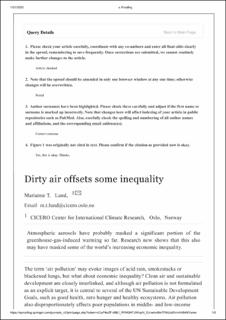Dirty air offsets inequality
| dc.contributor.author | Lund, Marianne Tronstad | |
| dc.date.accessioned | 2021-08-24T09:05:31Z | |
| dc.date.available | 2021-08-24T09:05:31Z | |
| dc.date.created | 2021-03-22T11:22:37Z | |
| dc.date.issued | 2020 | |
| dc.identifier.citation | Nature Climate Change. 2020, 10 185-186. | en_US |
| dc.identifier.issn | 1758-678X | |
| dc.identifier.uri | https://hdl.handle.net/11250/2770900 | |
| dc.description.abstract | Atmospheric aerosols have probably masked a significant portion of the greenhouse-gas-induced warming so far. Research now shows that this also may have masked some of the world’s increasing economic inequality. | en_US |
| dc.language.iso | eng | en_US |
| dc.publisher | Springer Nature Ltd | en_US |
| dc.subject | Atmospheric Chemestry | en_US |
| dc.subject | Climate-change impacts | en_US |
| dc.subject | Economics | en_US |
| dc.title | Dirty air offsets inequality | en_US |
| dc.type | Journal article | en_US |
| dc.type | Peer reviewed | en_US |
| dc.description.version | submittedVersion | en_US |
| dc.source.pagenumber | 185-186 | en_US |
| dc.source.volume | 10 | en_US |
| dc.source.journal | Nature Climate Change | en_US |
| dc.identifier.doi | 10.1038/s41558-020-0714-3 | |
| dc.identifier.cristin | 1899849 | |
| cristin.ispublished | true | |
| cristin.fulltext | preprint | |
| cristin.qualitycode | 2 |
Tilhørende fil(er)
Denne innførselen finnes i følgende samling(er)
-
Journal articles [468]
